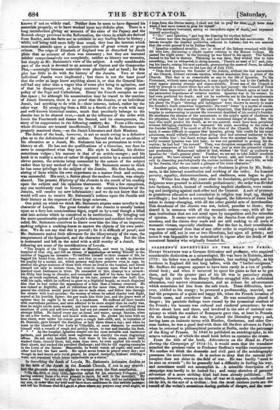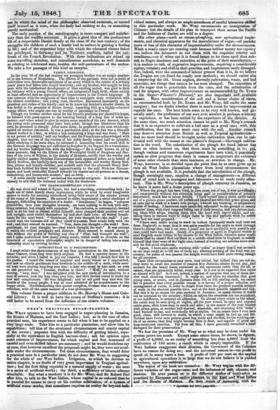STRRR.ONS 2- # Ji.DVENTURES ON THE ROAD TO PARIS. , HENRY STEFFENS was
a German litterateur and professor, who acquired considerable distinction as a mineralogist. He was born in Holstein, about 1773: his father was, a medical practitioner, but ranking legally, as his brethren in England did not long before, with the "barber-surgeons." Mr. Steffens the surgeon appears to have been rarely in a run of profes- sional luck; and when it occurred he spent his gains as fast as he got them, and for the greater part of his life was in pecuniary straits. Through his youth the son Henry Steffens struggled with an unfinished education, very narrow circumstances, and an ardour for advancement which sometimes led him from the safe track. These difficulties, how- ever, yielded to his energy ; he procured a professorship, married, and had the prospects of a quiet and happy life, when the French invasion of Prussia came, and overthrew them all. He was sometimes placed in danger; his patriotic feelings were roused by the tyrannical conduct of the French ; his income was reduced and rendered precarious; he was driven about here and there, and involved in the sort of national con- spiracy to which the conduct of Bonaparte gave rise, at least in Prussia. On the breaking out of the war, he joined the liberating army ; and, having been on intimate terms with Blucher, Gneiseuau, and other Ger- man leaders, he was a good deal with them till the first advance to Paris ; when be returned to philosophical pursuits at Berlin, under the patronage of the King of Prussia. In 1840 he published an autobiography, in ten octavo volumes; of which the small book before us contains the cream.
From the title of the book, Adventures on the Road to Paris during the Campaign of 1814-15, it would seem that the translator attached the greatest value to Professor Steffens's warlike reminiscences. We confess we think the domestic and civil part of the autobiography possesses the most interest. It is useless to deny that the natural phi- losopher does not shine in the field of war. He was hardly "meet to be sent on errands"; for be generally had a difficulty in finding his way, and sometimes could not accomplish it. A scientific description of a campaign was hardly to be looked for ; and many sketches of personal adventure of a more striking kind had been already published. The narrative, however, conveys an idea of war as it appears, confused and bit by bit, to the eye of a civilian : but the most curious parts are the record of the writer's sensations during periods of danger, and the man-
ner in which the mind of the philosopher observed externals, or turned itself inward as it were, when the body had nothing to do, or something purely mechanical. The early portion of the autobiography is more compact and satisfac- tory than the warlike accounts. It gives a good idea of the professional life of a respectable Danish family at the close of the last century ; of the struggles the children of such a family had to endure in gaining a footing in life ; and of the expectant hope with which the educated classes below the privileged, in Germany and its Northern confines, hailed the out- break of the French Revolution. With these indications are mixed up some travelling sketches, and miscellaneous anecdotes, as well domestic as relating to celebrated men, besides the self-portraiture of the author. We take a few passages of this kind as samples.
FAMILY PEDIGREE.
In the year '90 of the last century my youngest brother was an ensign quarter- ed in the fortress of Rendsbrirg.. The officers of the garrison were not in point of cultivation even favourablcapeconens of an army which in the course of a seventy years' peace had fallen into stupid inactivity; and my brother, who sought to keep pace with the intellectual development of that exciting period, was glad to form an intimacy with a young French officer, an emigrant of high birth, whose society at least afforded him an opportunity of improvement in the French language. It was common with the emigrants at that time to anticipate their restoration with the utmost confidence: this young man, therefore, discoursed incessantly on the grandeur and riches of his family; and as he knew my brother's slender means, he was lavish in his promises of future favour, regarding him as a highly-educated young officer, who might one day be worthy of patronage in France. Though my brother neither cared far his friends promises nor shared his hopes, be listened with good-nature to the boasting history of a long line of noble an- cestors; and when asked to give in return some records of his own descent, which the young exile presumed must have been noble, though less illustrious than his own, he promised to comply. After some delay, he produced a tin case which con- tained an ancient doeament. It was a parchment deed; at the foot was a blue silk riband worked in slyer, to which a box containing i huge seal was fixed. "Here is my patent of nobility," said my brother; and the Frenchman acknowledged with chagrin, that not one of the records of his noble family looked half so splendid. After studying it for some days, he returned it, lamenting that his small skill in the German language was not sufficient to decipher it; he begged for a translation; and my brother indulged him with the following—" Be it made known to all by these presents, that we the Elders of the Worshipful Guild of Surgeons and Bar- bers of the town of Wilster, in the datchy of Holstein, certify that the worthy and highly-skilled master Nicholas Zimmermann bath appeared before us in behalf of Henry Steffens, the lawfully-born son of the honourable and worthy Henry Stef- fens, citizen and brandy-distiller, and maketh oath that the aforesaid Henry Stef- fens hath fulfilled his three years' apprenticeship to the said Nicholas Zimmer- mann, and bath conducted himself towards his master and all persons as a decent, industrious, and honourable student," and so forth. . . . .
"A noble family indeed f." exclaimed the scornful emigrant. It is scarcely ne- cessary to add that the intimacy ended with the disclosure.
THE TRANSCENDS/MAIM FICHTE. • He was short and robust in figure, but had a searching, commanding look: ho. made use of-most keenly sharp expressions, while, he tried by every on,aginable means to make his meaning understood, being fully aware of the slender powers of too many of his hearers. He seemed.taclaim imperiously a strict obedience of thought, forbidding the suspicion of a doubt., f' Gentlemen," he began, "compose yourselves • turn your thoughts inwards; we have nothing to do now with any- thing external, but simply with ourselves." The audience, so commanded, seemed each to do his best to retreat within himself: some changed their position and sat bolt upright, some curled themselves up -and shut their eyes • all waited breath- lessly for the next word. "Gentlemen, let your thought be—the wall." I per- ceived that the listeners did all they could to possess their minds fully with the wall; and they seemed to succeed. Now, have you thought—the wall? Now, gentlemen, let your thought be—that which thought the wall." It was carious to watch the eviclent perplexity and distress. Many seemed to search about in rain without the power of' forming any idea of "what had thought the wall"; and I quite understood how many young minds, which could so stumble on the threshold of speculative philosophy, might, be in danger of falling into a most unhealthy state by striving further.
'Issrnofltitsfrost 't‘o su-rmmosoisuurt.
I must relate thaekenmatemes of my first introduction to the learned Pro- fessor Cramer, since,they wept/ally original. He had a country-house in the suburbs; and when I called to pay soy respects, I was told I should find him in his garden. I heard the soand of laughter and merry voices as I approached, and saw an elderly gentleman bent forwards in the middle of a walk, while seve- ral boys were playing leap-frog, over him: a laxly who stood by him said, as soon as she perceived me, "Cramer, Steffens is there." " Well,' , he said, without moving, leap, then." I was delighted with the new mode of introduction to a ream of science, took my leap clean over him, and then turned round to make my bow and compliments. He was delighted ; and as nif good leap also *on the hearth of the young people I was at once admitted as an acquaintance in the happy circle. Notwithstanding this quaint reception, Cramer was a man of deep rection, with all the quiet manner of a true philosopher.
This volume forms a proper addition to Mr. Murray's Home and Colo- nial Library. It is well to have the cream of Steffens's memoirs; it is still better to be saved from the infliction of ten octavo volumes.



























 Previous page
Previous page